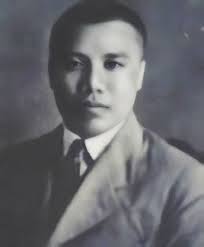Chang Tzu-p'ing (1893-?), author and geologist, was a founder of the Creation Society and a writer of popular romantic fiction. During the Sino-Japanese war, he served in the Japanese-sponsored government ofWangChingwei. Meihsien, Kwangtung, was the birthplace of Chang Tzu-p'ing. His father was a sheng-yuan in straitened circumstances who gave his son his early instruction in the Chinese classics. In 1906 Chang Tzu-p'ing entered the Kwang-yi Sino-Western School, an American Baptist mission school in Kwangtung, where he studied until 1909. In 1910 he passed the entrance examinations for the Kwangtung higher police school and considered criminal law as a career while he studied there. In 1912 he passed the Kwangtung provincial examinations for a government scholarship and went to Japan to study.
Chang Tzu-p'ing's stay in Japan was as important to his intellectual and personal development as to his professional training. About 1914, while studying the Japanese language in Tokyo, he became acquainted with Kuo Mo-jo, Yu Ta-fu (qq.v.), and other Chinese students who shared his interest in literature. Although Chang was granted a degree in geology from Tokyo Imperial University in 1922, he chose a literary career. In 1921 Kuo Mo-jo left Japan to return to Shanghai, where he worked as an editor. He published his first collection of poems, The Goddesses, which brought him immediate recognition. Kuo returned to Japan in July 1921 and met with friends to discuss the formation of a literary magazine. This group included Chang Tzu-p'ing, T'ien Han (q.v.), and Yu Ta-fu. The result of their discussions was the founding of the literary association known as the Creation Society.
The years between 1922 and 1924 were the heyday of the early Creation Society. Chang Tzu-p'ing worked actively with Kuo Mo-jo and his colleagues in editing the Creation Quarterly (Ch'uang-tsao chi-k'an), which was committed to popularizing romanticism and the concept of art for art's sake. Chang Tzu-p'ing was a regular contributor to the magazine. The year 1922 also saw the appearance of Chang's first novel, Ch'ung-chi-ch'i hua-shih [fossils of the alluvial age], published by the T'ai-tung Publishing Company in Shanghai, which also published the periodicals of the Creation Society. Chang soon established himself as an author of popular romantic fiction.
Chang Tzu-p'ing later stopped working for the Creation Quarterly and in 1 926 took a position as professor of mineralogy and head of the geology department at the National Normal University of Wuchang. There he began to learn something of revolutionary theories and proletarian literature. He returned to Shanghai in May 1928 and taught literature at Chinan University and Great China University. During this period Chang departed from romantic themes and attempted to write some political essays. He also tried his hand at running bookstores and publishing periodicals, but these ventures were short-lived. Chang reportedly maintained his connection with the Creation Society until that group was proscribed by the Nationalist authorities in February 1929. After 1929, Chang continued his creative writing and engaged in business. During the Sino-Japanese conflict he worked in the Japanese-sponsored government headed by Wang Ching-wei at Nanking. After the Japanese surrender, he sought temporary refuge in Taiwan, but later returned to Shanghai, where he was brought to trial on charges of collaboration in June 1947. Nothing further is known of him.
Chang Tzu-p'ing was a prolific author of novels and short stories and an active translator. His early romantic stories were the most interesting of his works. His later work was based largely on such stereotyped situations as the romantic triangle; his characters were superficial; and he exploited the physical aspects of love. His alleged espousal of the new nationalistic spirit of China in his writing merely meant adopting a new vocabulary after 1928. In all, his writings were designed as popular works to divert his readers, and, for a time, he enjoyed considerable popularity in China.
Chang Tzu-p'ing was married and reportedly had four children.

张资平
张资平(1893—?),作家,地质学家,创造社的创办人,通俗浪漫小说作家。中日战争期间,他在日伪汪精卫政府中工作。
张资平出生在广东梅县。他父亲在艰难困苦中取得了一点功名(秀才),教他儿子读经籍。1906年,张资平进美国浸礼会所办的广东广益中西学堂上学,一直学到1909年。1910年考入广东高等警官学校,他在警官学校学习时,打算以刑法学为他的毕生事业。1912年,他参加广东省的政府奖学金考试,中试后去日本留学。
他在日本期间,对他今后职业需要的智力发展和个人发展很为重要。约在1914年,他在东京学日文时认识了郭沫若、郁达夫,和另一些爱好文学的中国留学生。1922年,他虽在东京帝国大学取得地质学的学位,但他决定以文学为业。1921年郭沫若离日本回上海当编辑,他出版了第一部诗集《女神》,这本书使他很快成名。1921年7月,郭沫若又去日本和朋友们商谈创办文学刊物,其中有张资平、田汉、郁达夫等人,商谈结果,决定成立一个文学团体取名创造社。
1922—1924年间,是早期创造社的全盛时期,张资平同郭沫若和其他同人一起积极编辑《创造季刊》,这个刊物专门传布浪漫主义思想和为艺术而艺术的观点。张资平是杂志的经常撰稿人,他的第一部小说《冲积期化石》由创造社期刊的承印者上海大东书店出版,于1922年问世。不久张资平使自己成为一个通俗浪漫小说作家。
张资平后来中断了《创造季刊》的工作,1926年他在武昌师范大学当矿物学教授和地质系主任,他在那里开始学一点革命理论和无产阶级文学。1928年5月,他回上海在暨南大学和大夏大学教文学课程,那时,他放弃了浪漫派主题的写作而开始写一些政论文章。他还经营过书店、发行过期刊,但都为期甚短。据说,张资平和创造社的关系始终未断,直到1929年2月创造社被国民政府当局封闭。1929年后,他继续他的创作活动,还做一点生意。中日战争期间,他投向南京的日伪汪精卫政府。日本投降后,他暂在台湾躲避,不久又回上海,1947年6月他因投敌受审。此后的情况就不得而知了。
张资平是一个多产的长、短篇小说作家,又是一个热心的翻译作家。他早期的浪漫派小说最受人注意。他晚期的作品大部分以三角恋爱等老一套情节为主题,他描写的人物非常肤浅,他着重于肉欲的刻画。在他著作中所提倡的中国新民族主义精神只不过是1928年后采用的新名词而已。总之他的作品是通俗读物,仅供人消遣而已,他曾一度在国内享有盛名。
张资平结婚后,据说有四个孩子。